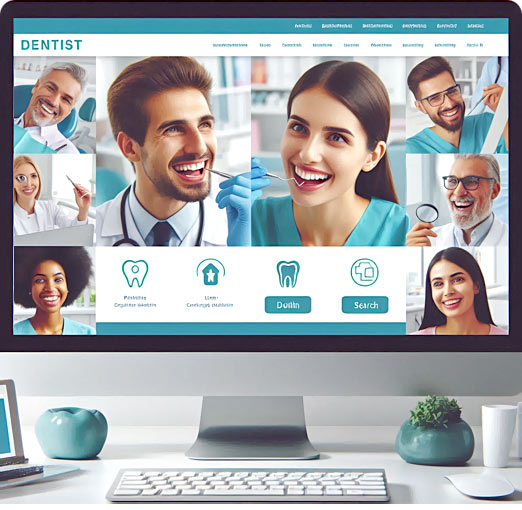In a time when patients are asking ChatGPT, Bing Copilot, and Siri for everything from “best dentist near me” to “how do I know if I need a root canal,” the way people discover dental care is fundamentally shifting. The question isn’t whether your dental website needs SEO—it’s whether your SEO is ready for the age of artificial intelligence.
This post explores why optimizing a dental website for AI-driven search is not only advisable, but essential—and how to do it in a way that respects your brand, empowers your team, and connects meaningfully with the patients you serve.

AI-Driven SEO For Dental Websites Is Now A Must-Have
What Is AI-Driven Search?
AI-driven search refers to the process by which artificial intelligence tools (like Google’s Search Generative Experience, Bing’s Copilot, and voice assistants) answer user queries not just by matching keywords, but by synthesizing context, intent, and meaning across multiple web sources.
Instead of giving users a list of links, AI search answers questions directly—often pulling snippets from trusted sites or offering a synthesized response. In this new model, visibility happens before the click.
The Implications for Dentists
- Patients may never reach your website if your content isn’t featured in the AI’s generated answer.
- Word-of-mouth now includes digital conversations—when patients ask Siri, Alexa, or ChatGPT for dental recommendations, will your practice be mentioned?
- Trust is being redistributed—AI engines surface content they deem authoritative, useful, and human-centered.
Why Traditional SEO Isn’t Enough
Traditional SEO focuses on rankings—meta tags, backlinks, keywords. It was sufficient when search engines offered ten blue links. But in the AI era:
- Content quality and depth matter more than ever.
- Structured data and semantic clarity guide AI context-building.
- Human-like relevance is valued over formulaic optimization.
AI-driven search isn’t just technical; it rewards trustworthy, well-organized, and empathetic content.
Four Reasons Dentists Must Embrace AI-Optimized Content
- AI is Now a Referral Source
Just as your reputation on Google Reviews or Yelp shapes patient behavior, so too does your representation in AI platforms.
- A potential patient might ask, “Who’s the best dentist for anxious patients near McHenry, IL?”
- If your site speaks clearly and confidently about gentle care, sedation options, and patient-first philosophy, you’re more likely to be surfaced as a trusted source.
- Voice Search and Conversational Queries Dominate
Voice search isn’t a fad—it’s how people multitask their way through life. And voice searches tend to be longer, more conversational, and emotionally loaded.
Example:
“I’m scared of the dentist. Who’s good with nervous patients?”
Optimizing for AI means incorporating phrases that sound like patient questions. FAQ-style content, dental patient testimonials, and real patient stories have never mattered more.
- AI-Powered Decision Tools Are on the Rise
Tools like Copilot or HealthTap aren’t just search engines; they’re becoming decision engines. That means your website must deliver clear, context-rich answers aligned with how patients research care.
By structuring your site to be AI-ready, you’re not just playing the SEO game. You’re establishing relevance at the moment of dental health decision-making.
- You Future-Proof Your Practice
This isn’t a passing trend. AI is already influencing how young families, professionals, and digital natives seek care. A dental website that ranks today but doesn’t serve tomorrow’s search behaviors is like having a billboard no one looks at, or one that is fading with each passing day.
The Foundations of AI-Optimized Dental Website Content
- Deep Understanding of Patient Language
AI doesn’t just index keywords—it “understands” context. That means your site should reflect the emotional language patients use:
- Instead of “sedation dentistry,” consider also incorporating “fear of the dentist,” “pain-free care,” or “gentle dental team.”
- Use dental patient testimonials to echo common concerns and aspirations.
- Clear, Structured Content Hierarchies
AI thrives on structure. Think:
- Bullet point lists for easy parsing
- Concise headers with specific intent
- FAQ sections (that mirror real patient queries)
- Embedded schema markup so search engines understand your services, hours, and specialties
- Authoritativeness and Originality
AI filters out spammy or duplicated content. But it rewards practices that publish:
- In-depth guides (e.g., “What to Expect During Your First Visit”)
- Local relevance (e.g., “Dental Health and Water Fluoridation in McHenry, IL”)
- Authored and ‘humanized’ pages from dental practice owners, dentists, and team members
Being seen as the most helpful voice in your niche is the new SEO currency.
How AI Search Ranks Content (And What You Can Do)
While exact algorithms are proprietary, research and experiments reveal a few consistent signals AI engines use:
| AI Ranking Signal | Implication for Dentists |
| Depth and utility of content | Avoid shallow blogs. Go deep into common patient concerns. |
| Trust indicators and citations | Link to ADA guidelines, showcase real reviews, and testimonials. |
| Structured data & schema markup | Use localBusiness, faq, and medicalCondition schema tags. |
| Freshness and originality | Update content regularly; rotate seasonal topics (e.g., “Back-to-School Dental Tips.”) |
A well-optimized page is not a “brochure”—it’s a conversation with the patient that AI learns to trust.
How AI-driven SEO diverges from traditional SEO:
1. Search Behavior vs. Search Results
- Traditional SEO: Focuses on ranking high in search engine results pages (SERPs) based on keywords like “family dentist McHenry IL.” Success meant earning clicks from that list of blue links.
- AI-Driven SEO: Optimizes for how people ask questions, often in full sentences or spoken form—e.g., “Which dentist is best for someone with a dental phobia?” The goal is to become the trusted source AI pulls into its generated answers—which may appear before any links.
- Keyword Density vs. Semantic Intent
- Traditional SEO: Emphasizes placing specific keywords and maintaining a certain keyword density.
- AI-Driven SEO: Focuses on semantic relevance. The content must align with the intent behind the query, not just match it word-for-word. So instead of optimizing only for “dental crowns,” your page might include patient questions like “How long do crowns last?” or “Is the procedure painful?”
- Meta Tags vs. Structured Conversations
- Traditional SEO: Relies on technical meta tags and alt text for rankings.
- AI-Driven SEO: Demands content that is conversational, trustworthy, and logically structured. AI tools favor headings, FAQs, and storytelling over technical metadata alone.
- Short-Form Pages vs. Authority-Building Content
- Traditional SEO: May reward thin pages targeting narrow keywords.
- AI-Driven SEO: Prioritizes depth and helpfulness—favoring rich content that answers real patient questions, explains procedures in plain English, and feels authentic.
- Backlinks vs. Credibility Signals
- Traditional SEO: Measures authority through external links to your website.
- AI-Driven SEO: Considers your overall trustworthiness, including:
- Real reviews
- Doctor bios written in a relatable tone
- Links to authoritative resources (like the ADA)
- Consistent, human-centric messaging across channels
- Bots vs. People-as-Proxies
AI-driven search is essentially an advanced patient concierge—guiding decisions before someone ever sees your homepage. Where traditional SEO optimized for algorithms, AI-SEO optimizes for AI’s model of what humans want.
In other words, you’re no longer just optimizing for Google. You’re optimizing for how Google understands human language, emotion, and trust.
What This Means for Web Developers, Copywriters, and Dental Teams
It’s a team sport now. A marketing agency that merely tweaks meta descriptions is missing the mark. You need:
- Copywriters who understand patient psychology
- Designers who understand user flow and accessibility
- Developers who implement structured data and page speed
- Dental teams who share patient stories and FAQs to fuel authentic content
Optimizing for AI is less about “gaming” and more about genuinely guiding. If your site is designed to serve patients fully, you’re already halfway there.
Conclusion: It’s Not About Bots—It’s About People
The irony of optimizing for AI is that, the more human your content, the better it performs. Dentists who lead in this space aren’t just future proofing their practices; they’re redefining what trust looks like in the digital health space.
So yes, dentists should optimize their websites for AI-driven search. Not because the algorithms demand it; because today’s patients do.

